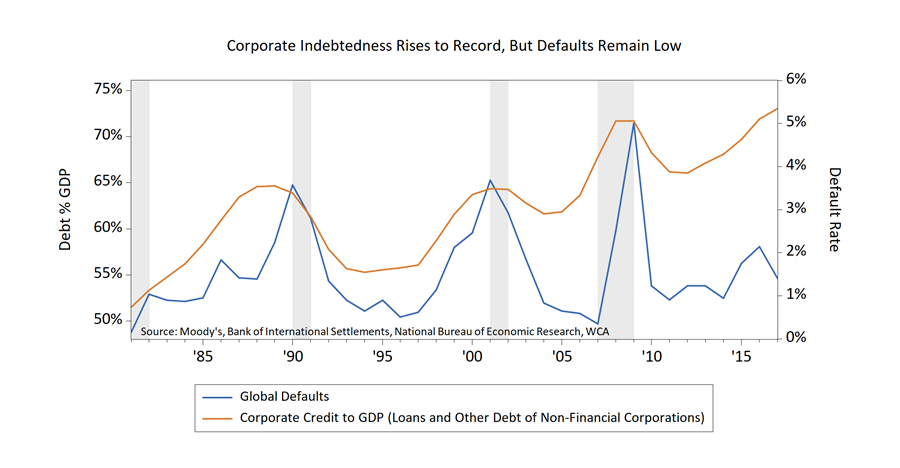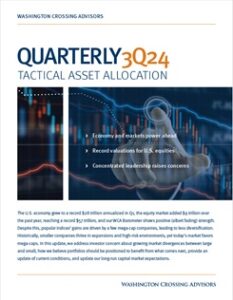Monday Morning Minute 050718
WASHINGTON CROSSING ADVISORS
THE WEEK AHEAD
Producer, Consumer, Import, and Export prices for April released this week.
MACROECONOMIC INSIGHT
Fixed Income Focus
Corporations continue to exhibit good financial health, which has helped drive default rates down. According to Moody’s Investment Research, defaults by corporate borrowers are below average. Last year, about 1.4% of all corporate issues globally defaulted. The average since the early 1980’s is 1.5%, and the high water mark was 5% back in 2009. The decline in defaults stands in sharp contrast to rising corporate indebtedness as outstanding non-financial corporate credit reaches a record high as a percent of GDP (chart, below).
Why Defaults Remain Low Despite Record Debt
Investors are willing to lend to companies at attractive rates, judging by low corporate bond yields relative to Treasury bonds. A positive global growth outlook, surging commodity prices, strong cash flow, tax cuts in the United States, and a wave of refinancing at attractive rates are all positives for corporate issuers. Rising short-term rates may also be encouraging some firms to issue debt to lock in low rates. Whatever the cause, the environment is a good one for corporations seeking to borrow.
The motive behind at least some of the borrowing could cause trouble for some issuers at some point. While it makes sense to borrow and invest in profitable projects, or refinance existing debt, other motives could be problematic. At this point in the cycle, companies facing intense pressure to boost otherwise weak organic growth may turn to buybacks and acquisitions. Strong levels of these activities, which can convey benefits in some environments, could prove damaging if done for the wrong reasons.
By leveraging a balance sheet to achieve near-term growth targets, a business increases risk and decreases flexibility, especially if interest costs rise or business conditions worsen in the future. While not a problem at this point, we have seen many times before how debt growth can lead to trouble for the economy.
How We Are Allocating Credit Exposure Now
If the economy suffers a downturn, we would expect default rates on lower quality, non-investment grade issues to experience default rates 2-3 times higher than investment grade. Increasing the exposure to higher-quality investment grade and Treasury bonds is one way to lessen credit risk should the economy suffer a downturn. While we don’t predict such an outcome at present, we reduced to neutral exposure to high yield corporate bonds during last summer. We also raised to neutral from underweight U.S. Treasury exposure.
The increase in indebtedness of U.S. non-financial companies is manageable in the current environment. Steady growth, strong cash flow, and investor confidence supports today’s low default rates. Still, it is important to keep an eye on how these trends evolve and recognize potential for increased risk, especially among weaker credits, should conditions change.
ECONOMIC DATA THIS WEEK
| Date | Report | Period | Survey | Prior | |
| Mon, May 7: | No Economic Data | ||||
| Tues, May 8: | JOLTS | Mar | 6.052M | ||
| Wed, May 9: | PPI M/M | Apr | 0.3% | ||
| PPI Y/Y | Apr | 3.0% | |||
| PPI ex Food & Energy M/M | Apr | 0.3% | |||
| PPI ex Food & Energy Y/Y | Apr | 2.7% | |||
| PPI ex Food, Energy & Trade M/M | Apr | 0.4% | |||
| PPI ex Food, Energy & Trade Y/Y | Apr | 2.9% | |||
| Thurs, May 10: | Weekly Jobless Claims | May 5 | 211K | ||
| CPI M/M | Apr | -0.1% | |||
| CPI Y/Y | Apr | 2.4% | |||
| CPI ex Food & Energy M/M | Apr | 0.2% | |||
| CPI ex Food & Energy Y/Y | Apr | 2.1% | |||
| Treasury Budget | Apr | -$208.7B | |||
| Fri, May 11: | Consumer Sentiment | May | 98.8 | ||
| Import Prices M/M | Apr | 0.0% | |||
| Export Prices M/M | Apr | 0.3% | |||
| Import Prices Y/Y | Apr | 3.6% | |||
| Export Prices Y/Y | Apr | 3.4% | |||
| Source: Bloomberg | |||||
ASSET ALLOCATION PORTFOLIO POSTURE
Based on shorter-term expectations, the “tactical satellite” allocation within portfolios is:
Overweight Stocks vs. Bonds
Kevin Caron, CFA, Senior Portfolio Manager
Chad Morganlander, Senior Portfolio Manager
Matthew Battipaglia, Portfolio Manager
Suzanne Ashley, Analyst
(973) 549-4168
www.washingtoncrossingadvisors.com
_______________________________________________________________________________________________________________________________________
Disclosures
WCA Fundamental Conditions Barometer Description: We regularly assess changes in fundamental conditions to help guide near-term asset allocation decisions. The analysis incorporates approximately 30 forward-looking indicators in categories ranging from Credit and Capital Markets to U.S. Economic Conditions and Foreign Conditions. From each category of data, we create three diffusion-style sub-indices that measure the trends in the underlying data. Sustained improvement that is spread across a wide variety of observations will produce index readings above 50 (potentially favoring stocks); while readings below 50 would indicate potential deterioration (potentially favoring bonds). The WCA Fundamental Conditions Index combines the three underlying categories into a single summary measure. This measure can be thought of as a “barometer” for changes in fundamental conditions.
The information contained herein has been prepared from sources believed to be reliable but is not guaranteed by us and is not a complete summary or statement of all available data, nor is it considered an offer to buy or sell any securities referred to herein. Opinions expressed are subject to change without notice and do not take into account the particular investment objectives, financial situation, or needs of individual investors. There is no guarantee that the figures or opinions forecasted in this report will be realized or achieved. Employees of Stifel, Nicolaus & Company, Incorporated or its affiliates may, at times, release written or oral commentary, technical analysis, or trading strategies that differ from the opinions expressed within. Past performance is no guarantee of future results. Indices are unmanaged, and you cannot invest directly in an index.
Asset allocation and diversification do not ensure a profit and may not protect against loss. There are special considerations associated with international investing, including the risk of currency fluctuations and political and economic events. Investing in emerging markets may involve greater risk and volatility than investing in more developed countries. Due to their narrow focus, sector-based investments typically exhibit greater volatility. Small company stocks are typically more volatile and carry additional risks, since smaller companies generally are not as well established as larger companies. Property values can fall due to environmental, economic, or other reasons, and changes in interest rates can negatively impact the performance of real estate companies. When investing in bonds, it is important to note that as interest rates rise, bond prices will fall. High-yield bonds have greater credit risk than higher-quality bonds. The risk of loss in trading commodities and futures can be substantial. You should therefore carefully consider whether such trading is suitable for you in light of your financial condition. The high degree of leverage that is often obtainable in commodity trading can work against you as well as for you. The use of leverage can lead to large losses as well as gains.
All investments involve risk, including loss of principal, and there is no guarantee that investment objectives will be met. It is important to review your investment objectives, risk tolerance and liquidity needs before choosing an investment style or manager. Equity investments are subject generally to market, market sector, market liquidity, issuer, and investment style risks, among other factors to varying degrees. Fixed Income investments are subject to market, market liquidity, issuer, investment style, interest rate, credit quality, and call risks, among other factors to varying degrees.
This commentary often expresses opinions about the direction of market, investment sector and other trends. The opinions should not be considered predictions of future results. The information contained in this report is based on sources believed to be reliable, but is not guaranteed and not necessarily complete.
The securities discussed in this material were selected due to recent changes in the strategies. This selection criterion is not based on any measurement of performance of the underlying security.
Washington Crossing Advisors LLC is a wholly owned subsidiary and affiliated SEC Registered Investment Adviser of Stifel Financial Corp (NYSE: SF).




